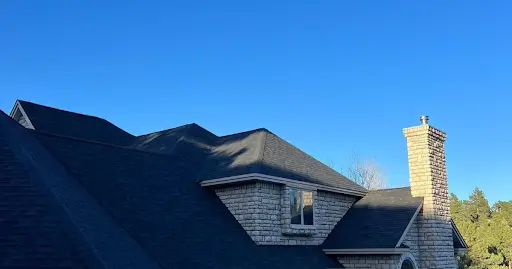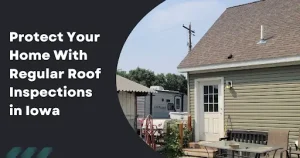Last winter, Sarah, a resident of Des Moines, was enjoying a cozy evening at home when she noticed a small water stain on her living room ceiling. At first, she brushed it off as nothing serious. But as the days passed, the stain grew larger, and soon, water started dripping from the ceiling. What Sarah thought was a minor issue turned into a significant problem. Her roof had suffered damage that could have been easily detected and fixed with a regular roof inspection. Unfortunately, now she faced costly repairs that could have been avoided with a simple routine check.
The Importance of Regular Roof Inspections
Regular roof inspections are a critical part of home maintenance. They ensure that your roof is in good condition, helping you avoid costly repairs and extend the lifespan of your roof. In Iowa, where the weather can be unpredictable, it’s even more crucial to stay ahead of potential issues. By investing in routine inspections, homeowners can catch small problems before they escalate into major headaches.
Why is it Important to Have Regular Roof Inspections and Maintenance?
The primary goal of regular roof inspections is to identify and address any issues that could compromise the roof’s integrity. From minor leaks to structural damage, routine maintenance damage checks can prevent problems from worsening. This proactive approach not only saves money but also ensures that your home remains safe and secure.
Types of Roof Inspections
Roof inspections serve various purposes, from general condition checks to more specific inspections after storms or before selling a home.
Annual Roof Inspections
An annual roof inspection is a general check-up that should be conducted once a year. This type of inspection evaluates the overall condition of the roof, checking for common issues like loose or missing shingles, leaks, and water damage. Regular annual roof inspections are essential for maintaining the roof’s health over time.
Post-Storm Inspections
Iowa’s weather can be harsh, with strong winds, heavy rain, and hail. After severe weather, a post-storm inspection is recommended to assess any damage that may have occurred. These inspections focus on identifying and addressing storm-specific damage to prevent long-term issues.
Pre-Sale Inspections
If you’re planning to sell your home, a pre-sale roof inspection can increase your property’s value. This inspection ensures that the roof is in good condition and can help you address any potential issues before putting your home on the market. Buyers will appreciate the peace of mind that comes with knowing the roof has been professionally inspected.
Benefits of Regular Roof Inspections
The benefits of regular roof inspections extend beyond just keeping your roof in good shape. They also contribute to the overall well-being of your home and finances.
Prolonging Roof Longevity
One of the most significant benefits of roof inspection is the potential to extend the life of your roof. By addressing minor issues before they escalate, you can avoid premature roof replacement. Regular inspections and maintenance are key to ensuring that your roof lasts as long as possible, protecting your investment in your home.
Preventing Costly Repairs
Small problems, like a loose shingle or minor leak, can quickly turn into costly repairs if left unchecked. Regular roof inspections allow you to catch these issues early, saving you money in the long run. In Des Moines, where weather conditions can vary dramatically, it’s essential to stay ahead of potential problems.
Enhancing Home Value
A well-maintained roof is a significant selling point for potential buyers. Regular inspections and prompt repairs not only protect your home but also enhance its value. When it’s time to sell, a well-documented history of regular inspections and roof repairs can be a valuable asset.
Roof Inspection Requirements in Iowa
In Iowa, there are specific roof inspection requirements that homeowners should be aware of. These regulations ensure that roofs meet safety and durability standards, particularly in areas prone to severe weather.
Compliance with Local Regulations
Roof inspections are not just a matter of good practice; they are often required to comply with local building codes and regulations. Ensuring that your roof meets these standards can protect you from legal issues and potential fines.
Insurance and Roof Inspections
Many insurance companies require regular roof inspections to maintain coverage. By keeping up with these inspections, you ensure that your insurance policy remains valid and that you’re covered in case of damage. It’s always a good idea to have insurance look at your roof after any significant weather event to assess potential claims.
How Often Should a Roof Be Inspected?
A common question among homeowners is, how often should a roof be inspected? The answer depends on several factors, including the age of the roof, local climate, and recent weather events.
General Guidelines
Most experts recommend that roofs be inspected at least once a year. However, if your home is in an area prone to severe weather, such as Des Moines, more frequent inspections may be necessary. In addition to annual checks, it’s wise to schedule an inspection after any major storm to assess potential damage.
Proper Roof Maintenance
Proper roof maintenance goes hand-in-hand with regular inspections. It involves taking the necessary steps to keep your roof in top condition throughout the year.
Routine Maintenance Practices
Routine maintenance includes cleaning gutters, removing debris, and repairing minor issues as soon as they arise. These simple tasks can prevent larger problems from developing and ensure that your roof remains in good condition. Combining regular roof inspections with routine maintenance is the best way to protect your home.
The Cost of Roof Inspections
Another important consideration is the cost. So, how much does a roof inspection cost in the US? While prices can vary depending on the size of the roof and the extent of the inspection, most homeowners can expect to pay between $150 and $400 for a professional roof inspection.
Is It Worth the Investment?
Given the potential savings in repair costs and the increased longevity of your roof, regular inspections are a wise investment. The relatively low cost of an inspection is a small price to pay compared to the potential cost of ignoring roof maintenance.
Connecting with Professional Inspectors in Des Moines
If you’re in Des Moines and looking to schedule a roof inspection, it’s essential to connect with a professional who understands the local climate and roofing requirements. A qualified inspector can provide valuable insights and help you keep your roof in optimal condition.
Finding a Reliable Inspector
When searching for a roof inspector, look for someone with experience in the Des Moines area. They should be familiar with the specific challenges posed by Iowa’s weather and have a proven track record of providing thorough and reliable inspections.
Maximize Your Home’s Lifespan
In conclusion, regular roof inspections are a crucial part of maintaining your home, especially in a climate like Des Moines. By investing in routine inspections and addressing minor issues early, you can prolong the life of your roof, prevent costly repairs, and enhance the value of your home.
For more information on roof maintenance, including the time it takes to replace a roof, check out our previous blog, How Long Does It Take to Replace a Roof?
FAQ’s
What is the overall goal of the roof inspection?
The goal of a roof inspection is to assess the roof’s condition, identify any damage, and recommend necessary repairs to maintain its integrity.
Why are maintenance inspections important?
Maintenance inspections are crucial because they help catch minor issues before they become major problems, ensuring the longevity of your roof.
What is proper roof maintenance?
Proper roof maintenance includes regular cleaning, timely repairs, and routine inspections to ensure the roof remains in good condition.
What are the benefits of roof repair and maintenance?
Regular roof repair and maintenance help prevent significant damage, save on costly repairs, and prolong the roof’s lifespan.




